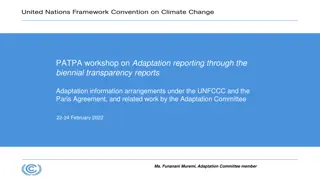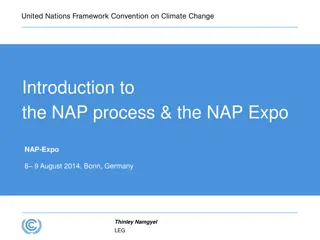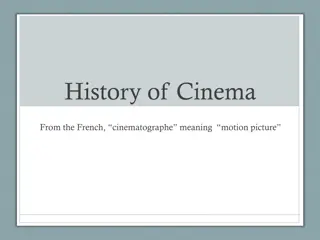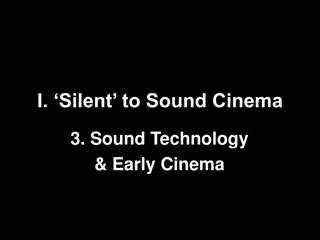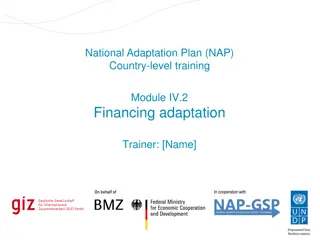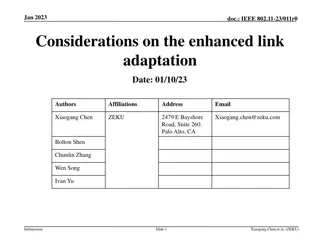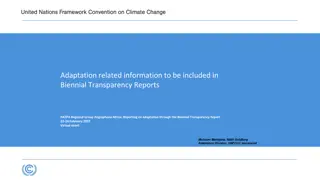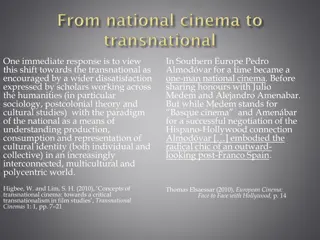Theories of Adaptation in Literature and Cinema
The concept of adaptation involves transforming literature from one form to another, such as from a play or novel into a movie or television drama. Various approaches and theories of adaptation exist, including perspectives from theorists like Linda Hutcheon, Bela Balazs, and Andre Bazin. These theories explore the process of adaptation as a creative endeavor that may involve reinterpretation, intertextuality, and creating new structures while considering fidelity to the spirit of the source material.
Download Presentation

Please find below an Image/Link to download the presentation.
The content on the website is provided AS IS for your information and personal use only. It may not be sold, licensed, or shared on other websites without obtaining consent from the author. Download presentation by click this link. If you encounter any issues during the download, it is possible that the publisher has removed the file from their server.
E N D
Presentation Transcript
BA II ENGLISH OPTIONAL , SEM III PAPER III (DSC-C5) LITERATURE AND CINEMA Module I: Theories of Adaptation Adaptation : Concept and Definition Origin: Latin word adaptare ,meaning to fit in Definition: Transforming literature from one form into another Oxford Dictionary: the action or process of adapting or being adapted Linda Hutcheon: to adapt means to adjust, to alter, to make suitable Meaning: to adapt means to adjust/alter/ make suitable in order to suit the new condition Modern context: transformation of a work, usually a play or a novel into movie, stage drama or television drama
APPROACHES TO ADAPTATION AND THORIES OF ADAPTATION Adaptation as secondary, inferior, derivative copy of the original Adaptation as new creation, new perspective, new interpretation. THEORIES OF ADAPTATION 1. Linda Hutcheon [Canadian theorist, Theory of Adaptation (2006)] Three perspectives regarding Adaptation: 1. Transposition : involves change of medium or change of context, different interpretations due to different points of view 2. Process of Creation: involves re-interpretation and re-creation; also called salvaging and appropriation 3. Process of Reception: is a process of intertextuality, involves appreciation, is re-appearance without imitation Supports fidelity to the source/ original Includes performances, orchestration, summary, critical commentary, sequels prequels in adaptation
THEORIES OF ADAPTATION continued 2. Bela Balazs [Theory of Film (1920-30)] Adaptation considered an independent work Screenplay considered new literary form Adaptation uses new aesthetic design and technology to create new version of source Does not subscribe to idea of fidelity Filmmaker given complete licence to extract or abandon Adaptation an inter-relative thing between literature and film
THEORIES OF ADAPTATION continued 3. Andre Bazin ( French theorist) Agrees with adaptation as an inter-relative thing between film and literature Disagrees with Balazs opinion that novel and drama are raw materials Supports and considers faithfulness to the spirit of the source fundamental in adaptation; adaptor must keep in mind vision of the creator and spirit of the work; fidelity per se not subscribed Considers adaptation as translation from one language (form) to another (linguistic medium to visual medium) Filmmaker should create new structure different from but parallel to the original
THEORIES OF ADAPTATION continued Adaptation intensifies and reveals nuances and details of the source 4. George Bluestone [American theorist, Novels into Films (1957)] Evaluates the inter-relative process between literature and films Agrees with Balazs- film adaptation as a new entity; film as a paraphrase of the novel Characters, key incidents and thematic high points become reproductive qualities for a film, hence, adapter a creator Novel and film meet at a point and then diverge (view opposite to Clair) Certain novels unsuitable for film adaptation (agrees with Kracauer) Successful screenwriter must understand the limitations of the film medium
THEORIES OF ADAPTATION continued 5. Seigfried Kracauer (Theory of Film) Introduced the concept of cinematic and uncinematic nature of literary sources. Adaptations effective only if content of novel is firmly rooted in objective reality, not on mental and spiritual experience. (nature of source also responsible for success or failure of film adaptation) Realistic and naturalistic novels most suitable for adaptation 6. Thomas Leitch Adaptation is a subset of intertextuality; all adaptations are intertexts Adaptations are exclusively cinematic Adaptations involve transfer of narrative elements from one medium to another (intermedial)
THEORIES OF ADAPTATION continued Adaptations are counter-ekphrases (ekphrases = a literary description of or commentary on a visual work of art, to point out, show, tell, explain) Adaptation, a text whose status depends on the audience s acceptance of a deliberate invitation to read them as adaptations. 7. Geoffrey Wagner [The Novel and the Cinema (1975)] Identifies three methods of dramatization: transposition, commentary and analogy Transposition- novel directly given to screen, full fidelity; most pervasive and least satisfactory Commentary- original altered purposefully to re-emphasize or restructure; an interpretation, no literal translation Analogy- a departure and not a literary original; fiction taken as point of departure and analogous techniques used to portray issues
THEORIES OF ADAPTATION continued 8. Rene Clair ( French film director, developed theory in 1926) A true cinema is not just a chronological sequencing of the literary source; must have something original not found in the original Director or scriptwriter should mediate or interpret the source, give a new aesthetic design (process of transformation) 9. LasterAsheim Adaptation is an inferior version of the source Adaptation trivializes, over-simplifies, exaggerates, overstates, romanticizes the theme of the novel (emphasizes fidelity) 10. Morrissette Expects equivalence between page and screen ( which is obviously impossible)
THEORIES OF ADAPTATION continued 11. Jean Mitry Believes that fidelity to original is impossible (opposes fidelity) Adaptation is neither a creation nor an expression but only representation or illustration Adaptation provides a valuable reflection of the original






